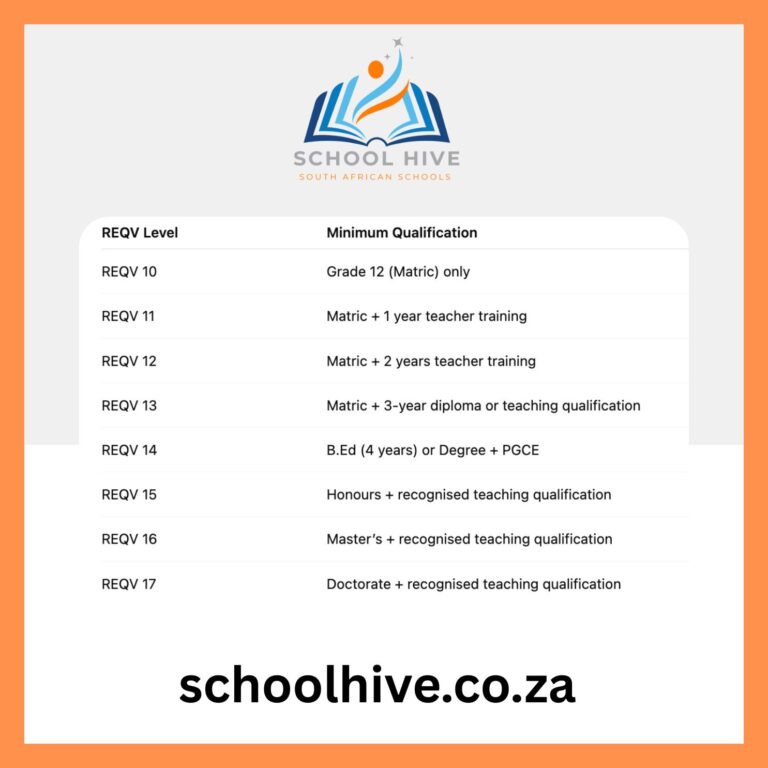In order to become a Grade R teacher in South Africa, you will need to achieve the Grade R requirements which are: a recognised ECD qualification (minimum NQF Level 4 or 5), practical teaching experience, and registration with SACE. Without meeting these requirements, you cannot become a Grade R teacher. In South Africa, Grade R teachers are known as Early Childhood Development (ECD) practitioners. They are classified under the Foundation Phase teaching category, as part of the formal schooling system.
On this page we will cover the following important topics, which will give you all there is to know about Grade R teacher requirements as well as qualifications and required experience:
- What Qualifications Do I Need to Be a Grade R Teacher?
- Grade R Teaching: List of Requirements and Experience
- Step-by-Step on How to Become a Grade R Teacher in South Africa
- Early Childhood Development Courses Available in South Africa
- Teaching Grade R with an ECD Level 5
- Teaching Grade R with an ECD Level 4 Certificate
- Teaching Grade R with a PLAY SA Certificate
- Is the Diploma in Grade R Phased Out?
- ECD Level 5 Salary per Month
- Finding Your First Early Childhood Education Job
---Advert---
What Qualifications Do I Need to Be a Grade R Teacher?
As already highlighted in the intro, to become a Grade R teacher, you will need the following qualifications: a recognised ECD qualification, practical classroom experience, registration with SACE, and in some cases, a Diploma or Degree in Foundation Phase Education. Without these, you will not be considered for formal employment in a public or registered private school. Let us look at each qualification below and why you should have it if you want to become a Grade R teacher:

- Recognised ECD Qualification (Level 4 or 5):
You must have a certificate or diploma in Early Childhood Development that is registered on the NQF and accredited by ETDP SETA. Level 4 is the entry point, but Level 5 is more widely accepted for formal school settings. - Practical Experience in a Classroom:
Most training courses require that you complete workplace experience. This is important because schools want teachers who can actually manage a group of 5 to 6-year-olds with confidence and structure. - Registration with SACE (South African Council for Educators):
Before you can be employed as a teacher, you must be registered with SACE. This confirms that you are recognised as a qualified educator and have met the ethical standards required to work with children. - Diploma in Grade R Teaching or Bachelor of Education in Foundation Phase (if applicable):
Some schools prefer candidates with a full Diploma or Degree in Foundation Phase Teaching. This is especially true in public schools where DBE requirements are more strict.
Grade R Teaching: List of Requirements and Experience
For you to successfully become a Grade R teacher, you do not only need qualifications. You also need patience, passion for working with children, good communication skills, hands-on experience, and the right mindset. Remember, you will be dealing with kids. So being calm, playful, and emotionally stable is non-negotiable. Even the Department of Education does not support placing untrained or impatient individuals in Grade R classrooms.
Apart from the qualities mentioned above, you will need to know the language of the kids you will be teaching. If you are in a Venda area, with Venda kids, you will need to know how to speak Tshivenda. Having a second language helps you communicate better, give clear instructions, and build trust with the children and their parents.
So in a nutshell, here is the list of all requirements to become a Grade R teacher in South Africa:
- An ECD qualification (minimum NQF Level 4 or 5, accredited by ETDP SETA)
- Diploma in Grade R Teaching or Bachelor of Education in Foundation Phase (for public school posts)
- Practical teaching experience (done during your studies or through volunteering)
- Registration with SACE (South African Council for Educators)
- Ability to speak the language of the learners
- Good communication and listening skills
- Passion for working with children
- Patience, emotional stability, and a playful nature
- Clean criminal record (especially in relation to working with minors)
- Basic classroom management and child safety skills
Step-by-Step on How to Become a Grade R Teacher in South Africa
As we have explored the qualifications and requirements needed to become a Grade R teacher, now it is time to contextualise everything into a step-by-step process.
Below is an easy-to-follow step-by-step process of becoming a Grade R teacher, from high school up to the day you become a qualified Grade R teacher:
Step-by-Step Process
- Pass Grade 12 (Matric) with the right subjects
Aim for a Diploma or Bachelor’s Pass. Subjects like English and Life Orientation are essential. Some institutions also look at your marks in Home Language and Maths or Maths Literacy. - Choose your study path: ECD or Foundation Phase Teaching
- You can study for an ECD Certificate (Level 4 or 5) from a TVET college or accredited private college.
- Or go for a Diploma in Grade R Teaching or a Bachelor of Education in Foundation Phase at a university.
- Register and complete your qualification
Make sure your course is accredited by ETDP SETA or CHE, and that your institution is recognised by the Department of Higher Education and Training (DHET). - Get practical teaching experience
During your studies, you will be placed in schools to gain real classroom experience. Use this time to build confidence and show your passion. - Register with SACE (South African Council for Educators)
This is compulsory. Without SACE registration, you cannot be employed as a teacher in any formal schooling environment. - Apply for teaching jobs or volunteer to gain more experience
Start with preschools, ECD centres, or Grade R classes in public or private schools. Even NGOs running early learning programmes can open doors. - Keep upgrading your qualifications
If you started with Level 4 or 5, consider upgrading to a Diploma or Degree. The more qualified you are, the better your chances for permanent jobs and higher pay.
Early Childhood Development Courses Available in South Africa
In this section, we discuss the available Early Childhood Development (ECD) courses to study in South African institutions. The ECD courses in South Africa are strictly offered by TVET colleges, accredited private colleges, and SETA-accredited training providers. You will not find an ECD course at a traditional university like Wits, UCT, or Stellenbosch — because universities mostly focus on Foundation Phase Teaching Degrees, not ECD certificates.
Below is a list of all ECD courses and relevant places to study:
- ECD Level 4 Certificate
Entry-level qualification that allows you to work as an assistant in early learning centres.
Where to study: TVET colleges like Northlink, False Bay, Ekurhuleni East, or private providers like Lyceum, Oxbridge Academy. - ECD Level 5 Higher Certificate
A step up from Level 4. This qualification prepares you to manage and run Grade R or early childhood classrooms.
Where to study: Boland TVET College, College of Cape Town, SA College of Education, and other SETA-accredited providers. - National Diploma in Early Childhood Development (Level 6)
This is an advanced qualification for those who want to become ECD specialists, trainers, or centre managers.
Where to study: Some private institutions and training academies that are accredited by ETDP SETA. - Short Skills Programmes in ECD
These are unit-based courses like child stimulation, learning through play, or classroom planning.
Where to study: Play SA, SmartStart, or NGO-based training programmes.
Is the Diploma in Grade R Phased Out?
There have been rumours going around that the Diploma in Grade R Teaching is being phased out, but that is not fully accurate. What is happening is that some institutions are now aligning their qualifications with the new national standards, which means older versions of the diploma are being replaced or upgraded. If you are already studying the diploma, do not panic. It is still recognised by the Department of Basic Education. But moving forward, many colleges are beginning to offer the Bachelor of Education in Foundation Phase instead, especially if you want to work in public schools.
ECD Level 5 Salary per Month
If you have an ECD Level 5 certificate and you are working as a Grade R teacher, your salary will depend on where you are employed. In most community-based centres or private preschools, you can expect a salary between R3 500 to R6 500 per month. In public schools that are funded by the Department of Basic Education, some ECD Level 5 teachers can earn up to R7 000 or even R8 000 per month, but this is usually only if you are employed full-time and registered with SACE. The salary at Level 5 is not high, which is why many practitioners decide to upgrade to a diploma or degree in order to qualify for higher-paying posts.
Finding Your First Early Childhood Education Job
If you meet all the requirements of a Grade R teacher, your final step will be to look for your first job. Grade R teaching jobs are mostly found in private preschools, community-based ECD centres, public schools that offer Grade R, and NGO programmes that support early learning.
Word of advice: try to build professional connections with ECD centre owners and showcase your qualifications and your genuine interest in the job. If they do not have any jobs available, please ask to volunteer for free, and you will thank us later. Do not quit volunteering until you have successfully completed a three-month period. Many new teachers quit too soon, before their true talents are even noticed. Sometimes, your breakthrough comes after consistency.
Other places to find a job as a Grade R teacher are:
- The Department of Basic Education’s vacancy bulletin
- Private school job boards and websites
- NGOs like SmartStart, Cotlands, or Nal’ibali
- Local Facebook groups for teachers and early childhood jobs
- Online job platforms like Indeed, Careers24, PNet, and LinkedIn
- Community WhatsApp groups or local church networks
Always make sure your CV is ready, your SACE certificate is attached, and you include a copy of your qualification when you apply. First impressions count.
---Advert---






